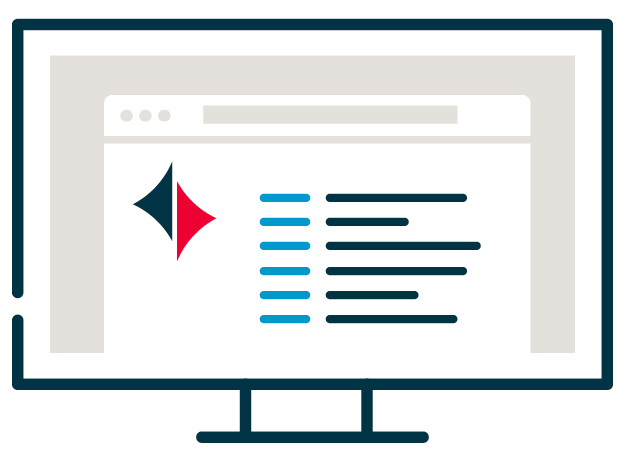
Resources > Cybersecurity
Stay safe out there
Being in the know is the first step to protecting yourself and your business from cyber fraud. Choice Bank is committed to providing you with up-to-date resources and tips to help you stay informed.
For Businesses
According to the National Small Business Association, 43% of small businesses reported being the victim of a cyberattack.
Now, more than ever, it is crucial to take preventative measures to help protect you and your business from cyber fraud. The following are practices and procedures that can be put in place to aid prevention:
Human error is the weakest link in cybersecurity and contributes to at least 95% of all security incidents.
Businesses usually become compromised through a “phishing” attack. This attack might be disguised in a fraudulent email that appears to be a credible communication or it might be embedded in a website. When links or attachments in an email or on a website are opened, malware may be installed on the user’s computer. This malware may record keystrokes, capture otherwise secure information, and allow the attacker access to the network. In another type of scheme, the attacker intercepts email communication or “spoofs” employee email addresses, making it appear that an email is being sent legitimately from a co-worker or vendor. In this case, the attackers then use this compromised communication to instruct the employee to wire or transfer money.
To put it in plainly, systems usually become compromised because of something someone does (i.e. employee clicks on an attachment from an unknown source) or something that someone doesn’t do (i.e. failing to set a strong password or failure to patch operating systems and ancillary applications such as Adobe and Java). Having the best firewall on the market isn’t enough to protect you. Every business needs well-informed employees that can understand and identify various threats. Furthermore, it’s equally important they recognize how certain actions or inaction can put the company in a comprised position.
Cybersecurity and Infrastructure Security Agency Resources
Materials on Cybersecurity for Small Businesses
Cybersecurity Resources for Businesses
Cybersecurity and Infrastructure Security Agency (CISA)
National Cyber Security Alliance
Cyber Essentials for Small Businesses and Small SLTT Governments
Vulnerability Scanning for Your Business
Rethink Cyber Safety Rules and the “Tech Talk” with Your Teens
Cyber Safety Considerations for K-12 Schools and School Districts
Teleconferencing and Online Classroom Hijacking During COVID-19 Pandemic
For Individuals
According to the University of Maryland, hackers attack every 39 seconds – an average of 2,244 times a day.
Now, more than ever it is crucial to take preventative measures to help protect yourself from cyber fraud. The following are practices and procedures that can be put in place to aid prevention:
Every day, thousands of people fall victim to fraudulent emails, texts, and calls from scammers pretending to be their bank. And in this time of expanded use of online banking, the problem is only growing worse.
Online scams aren’t so scary when you know what to look for. And at Choice Bank, we’re committed to helping you spot them as an extra layer of protection for your account.
We want every bank customer to become a pro at spotting a phishing scam—and stop bank impostors in their tracks. It starts with these four words: Banks Never Ask That. Because when you know what sounds suspicious, you’ll be less likely to be fooled.
5 Things We Will Never Ask For Through Phone or Email:
- Your Full Account Number
- Your Full Debit or Credit Card Number
- Your CVV Number
- Your PIN Number
- Your Full Social Security Number
In the end, it’s about trusting your instincts. If something doesn’t feel right, hang up and give us a call directly. We are always happy to help because your safety and peace of mind are a part of our #PeopleFirst promise.
Latest News
Stay in the know – we’ll share the latest updates, tips, and news on our blog.
1, 2 Source: Cybersecurity Ventures
3 Source: Verizon 2019 Data Breach Investigations Report


